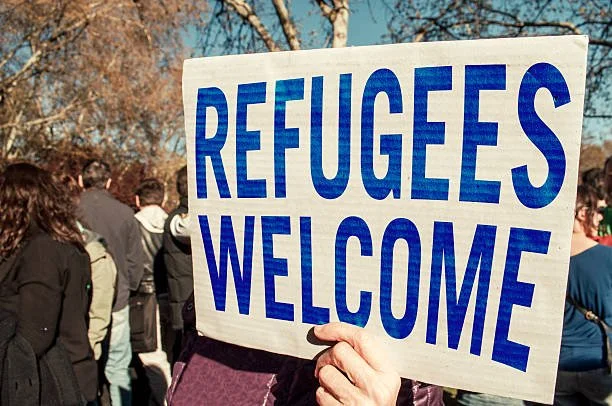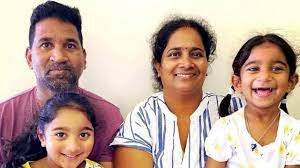Analysis shows that the demonisation and politicisation of asylum seekers and refugees may be starting to wane. But will this shift in attitude lead to better outcomes? A look at historical data and insights from the soon-to-be-released Amnesty International Australia's Human Rights Barometer.
Home to Bilo
The Nadesalingam family
One of the first actions of the new Labor Government was to return the Nadesalingam family back to their adopted home town of Biloela in regional Queensland. By any objective measure the family had gone through hell. Their welcome home was celebrated across the country.
A change in rhetoric?
Following on from this, the Albanese Government has said they will look at the Temporary Protection Visa program (where an estimated 31,000 people are still waiting to find out their status ) and other ways asylum seekers are assessed for refugee and permanent residency status to bring further compassion and efficiency to the system.
However, the contentious policies around boat turnbacks and detention remain. There are currently 1,534 asylum seekers in detention, with 217 being detained offshore in Port Moresby and on Nauru.
For both major parties these policies are still seen as necessary and effective deterrents for people smugglers (and to show the rest of us they are "strong on borders"). This is despite other views that question the effectiveness of these policies and the rationale around the cruelty asylum seekers have to endure. The lawfulness of these policies has always been thoroughly questioned.
But on a superficial level at least, these recent moves seem to indicate a shift in attitudes towards asylum seekers and refugees and how we treat them. A stark contrast to some of the rhetoric and policies that have been used to politically weaponise these issues for most of the 21st Century (and arguably decades before).
So do these shift represents changes in broader community sentiment around asylum seekers and refugees? Or is it simply a new government trying to differentiate itself from its predecessor? Or a bit of both?
A change in political potency?
Tracking long term shifts in Australians' attitudes to asylum seekers and refugees is not easy. Unfortunately there has not been consistent tracking surveys dealing with the specific details of these issues over the last 20 years or so (it’s not always easy to compare apples with apples).
However, there are a few places we can look to get a clue. The Australian Electoral Study is a good place to start. It tracks a range of issues and their impact on voting preferences in each Federal election.
One way to look at shifts in attitudes is to compare how important an issue such as asylums seekers and refugees is in voting decisions.
Back in 2001 with 9/11, Tampa and 'children overboard' fresh on our minds, 51% of Australian said the issue of asylum seekers and refugees was 'extremely important' in how they decide to vote. For 13% it was the most important issue (just below issues such as education and health).
Source: The Australian Electoral Study
Cut to 2019 (unfortunately we don't have the 2022 results yet) and Scott Morrison as PM - a man whose career was mostly based on “stopping the boats” and being “strong on borders”. After the ‘miracle victory’, only 33% said the issue was 'extremely important' for their vote, with just 3% saying it was the most important issue.
Clearly there has been a drop in potency around the issue over the last 20 years. Perhaps due to less media coverage and perhaps due to governments being less willing to disclose details around asylum seeker arrivals and processing (noting that during this time the number of asylum seekers and refugees worldwide has dramatically increased).
Source: The Australian Electoral Study
Of equal interest is the depoliticising of the issue. Back in 2001, when asked which party's policy they prefer to handle the issue of asylum seekers and refugees, 46% said the Coalition and 15% the ALP. In 2019 these numbers narrowed, with the Coalition losing its once strong grip on the issue. The figures were Coalition 35% and ALP 25%. So politically at least, the issue seems to be less contentious. But has there been a shift in community attitude?
A change in attitudes?
Attitudes towards the number of refugees Australia takes in on humanitarian grounds may give us a clue.
In 2016, the Scanlon Foundation's Mapping Social Cohesion survey asked whether our current refugee intake should increase, decrease or stay the same.
In 2016, just under one quarter (23%) said our refugee intake was too low and should be increased. While the same Scanlon data for 2022 is not available, our recent Human Rights Barometer survey, shows the percentage of Australians who think our refugee intake should increase has gone up by a third from 23% to 31%. Similarly, those who think we should be letting in less refugees has halved, from 30% in 2016 to 14% in 2022. (NB. The question wording between the Scanlon study and the Human Rights Barometer was slightly different, but the size of the movement indicates the shift in attitude is reflective).
Consistent with the depoliticisation of the issue, is the finding in the 2022 Human Rights Barometer that voting preference (for the two major parties) has little bearing on attitudes to the level of refugee intake.
Ukraine in the brain
The drivers of these changes are multi-faceted but some of the recent shifts can be partly explained by the war in Ukraine, the swift response from many countries and the extensive coverage it has received. Recent Ipsos studies have shown the war in Ukraine and the fleeing of 4.9 million Ukrainian refugees across Europe and elsewhere has galvanised global support for refugees in general.
The 'right' type of refugees
While these findings seem to show a more open-minded and compassionate view of asylum seekers and refugees, it is worth considering the recency and similarity biases that might be involved. For example, another Ipsos study shows that for many countries (especially western democracies) levels of support for accepting refugees from other countries are lower than support for those from Ukraine.
In Australia, two thirds (66%) support allowing in more refugees from Ukraine. However this level of support drops for refugees from countries with the largest number of refugees, such as Myanmar (44%), Afghanistan (42%), Syria (39%), Venezuela (38%) and South Sudan (35%).
More than words
According to the most recent Human Rights Barometer, only 14% of Australians believe refugees should not be settled in Australia. A majority of Australians also say if communities wish to sponsor refugees so they can live in those communities, they should be allowed to (57%). A sentiment reflective of the outpouring of love towards the Nadesalingam family in Biloela.
But can these positive feelings lead to a certain smugness and complacency? Along with many other countries Australians over-estimate the number of refugees we take in. A quarter (25%) of us believe we take in the largest number of refugees in the world – whereas we are the 41st ranking country in terms of refugee intake and 20th on a per capita basis (currently 13,750 per year).
Attitudes seem to be shifting in the right direction but it feels we are still a long we off from matching those words and feelings with real action for the almost 32 million asylum seekers and refugees around the world.
Results from the latest wave of the Human Rights Barometer, a tracking of Australians’ attitudes to human rights and other social issues developed by Pragmatic Research in conjunction with Amnesty International Australia and Ipsos, will be released in August this year. Get in touch if you’d like to know more.







